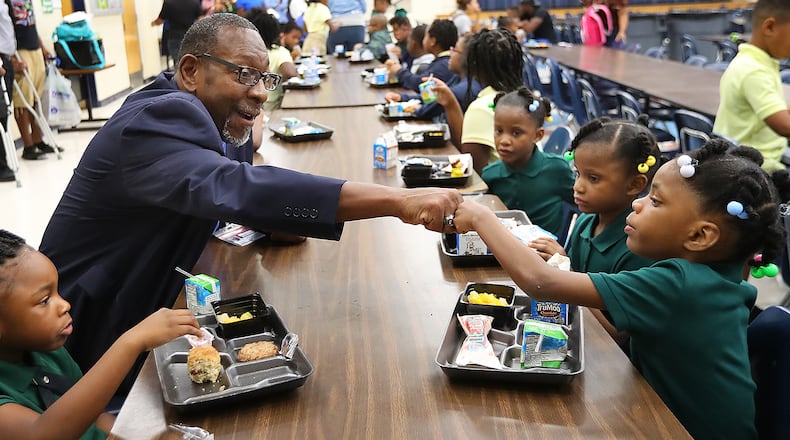Atlanta and DeKalb believe their schools will fare better with new superintendents, which explains decisions by both districts to part ways with their current leaders.
The DeKalb decision continues a pattern of churn at the top. The school board turned up the pace on that churn today, voting 6-1 to speed up the departure of Superintendent Steve Green.
Hired in 2015, Green was slated to leave his post in June, but the board agreed to send him home now and bring in longtime administrator Ramona Tyson to again serve as interim superintendent.
The DeKalb school board did not approve contract extensions for Green in 2018 and 2019, which would have kept him here beyond 2020.
So, while DeKalb will be writing checks to two superintendents for seven months, only one will be showing up at the office.
In a controversial decision in September, the Atlanta school board said it would not extend the contract of Meria Carstarphen when it expires June 30.
The announcement grew out of tensions between Carstarphen, a popular figure with the public, and a new slate of school board members. APS is searching for a new chief to take over in July.
This brings me to a question I’ve been considering for a while: Do superintendents matter in the long run?
They come and go so fast in metro Atlanta that it's hard to keep track of them or gauge their impact. (With the exception of J. Alvin Wilbanks who was named chief executive officer and superintendent of Gwinnett County Public Schools in 1996.)
The assumption has been that superintendents are vital to student success, and that frequent turnover is disruptive because it upends decision-making and leaves staff uneasy and uncertain.
But a 2016 report by the Brown Center on Education Policy at Brookings concluded:
The transformative school district superintendent who single-handedly raises student achievement through dent of will, instructional leadership, managerial talent, and political acumen may be a character of fiction rather than life. At the least, such individuals are very difficult to identify using quantitative tools.
Further, real superintendents, defined as the entire class from the best to the worst, have very little influence on student achievement collectively compared to all other components of the traditional education system that we measure.
A parent who wants the best education for her child would be well advised to care about the teacher and classroom to which her child is assigned and the school in which that classroom is embedded. The district and community in which the school and classroom exist are also worthy of some of her attention as is the curriculum her child will encounter. But, with rare exceptions, the coming and going of school superintendents can be off her radar screen.
Superintendents associated with substantive improvements in district performance are quite rare, likely to be playing a part in an ensemble performance that doesn't depend uniquely on them, and difficult to identify reliably using the best empirical strategies presently available. In the end, it is the system that promotes or hinders student achievement. Superintendents are largely indistinguishable creatures of that system.
After writing about education for 22 years and seeing metro districts cycle through superintendents, I’ve come to two conclusions:
Most districts don't keep superintendents in place long enough to see policy changes and reforms take root.
Most school boards end up hiring replacements who are a lot like the superintendent they sent packing.
Maybe, Green and Carstarphen should just switch jobs -- it would save taxpayers a bundle on search firms.
About the Author
The Latest
Featured



